| Srl | Item |
| 1 |
ID:
105958


|
|
|
|
|
| Publication |
2011.
|
| Summary/Abstract |
The Irish border (between Northern Ireland - the 'North' and the Republic of Ireland - the 'South') has been described as a 'natural' cultural divide between the island's two dominant indigenous ethno-national communities. However, an examination of key resources of ethno-national group culture - religion, sport and language - provides evidence to challenge this representation. Moreover, in the post-1994 period of conflict transformation, evidence is also presented to support the proposition that the Irish border region has developed into a cultural space in which Irish nationalist and Ulster unionist ethno-national communities can explore cultural differences and commonalities through cross-border, cross-community contact and communication in small group encounters. This space underpins the reconfiguration of the border from barrier to political bridge between North and South. European Union (EU) Peace programmes for Ireland, beginning in 1995, provided the support for a cross-border approach to escaping the cage of ethno-national conflict in Northern Ireland. However, post-2004 EU enlargement signalled the beginning of the end for EU Peace funding, and severe economic recession has undermined the expectation of British-Irish intergovernmental intervention to support cross-border partnerships and their work. Therefore, the outlook for the sustainability of this cross-border cultural space is gloomy, with potentially deleterious consequences for the continued reconfiguration of the border from barrier to bridge.
|
|
|
|
|
|
|
|
|
|
|
|
|
|
|
|
| 2 |
ID:
105955
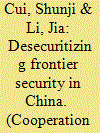

|
|
|
|
|
| Publication |
2011.
|
| Summary/Abstract |
Should 'security' or 'securitization' be accorded positive or negative value? The Copenhagen School prefers desecuritization (positive value) to securitization (negative value). By examining securitization and desecuritization processes in China's approach to frontier security, the Copenhagen School argues that, in general, a strategy of desecuritization has proved effective. However, that does not mean that desecuritization should be seen as inherently positive; indeed, China's desecuritization strategy still encounters problems. To build conditions for a lasting frontier security, it is necessary to go beyond the current state-centric national security discourse and to give more attention to the societal security of the frontier people, their identity and culture. Thus, it is suggested in this article that frontier security studies should transcend 'positive-negative' debates and focus more on the 'referent object' of security: who and what we really want to secure and the means by which these objectives can be achieved.
|
|
|
|
|
|
|
|
|
|
|
|
|
|
|
|
| 3 |
ID:
105959
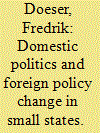

|
|
|
|
|
| Publication |
2011.
|
| Summary/Abstract |
The article sets out to further an understanding of how domestic politics can impact on foreign policy change in small states. The case of interest is the change that occurred in the foreign policy of Denmark when its government managed to put an end to the 'footnote policy' in mid-1988. The main conclusion is that changes in two particular domestic political factors, in terms of political party opposition and public opposition, facilitated a change in foreign policy for the Danish government. Changes in party and public opposition created opportunities for the government to use foreign policy change as a strategy to increase its political power on the domestic scene. In this case of foreign policy change, domestic political factors and external forces were equally important.
|
|
|
|
|
|
|
|
|
|
|
|
|
|
|
|
| 4 |
ID:
105957
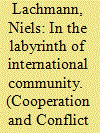

|
|
|
|
|
| Publication |
2011.
|
| Summary/Abstract |
The conceptualization of international community presents important challenges for the study of international relations. This article suggests that it is best considered as an attempt to build a universalistic framework through transnational practices that however remains challenged by particularistic dynamics, even though it is supposed to be common to all international actors. The article addresses both the complexity and the normative implications of community-building at the international level through the example of the Alliance of Civilizations, a programme of the United Nations which aims to promote intercultural understanding and thus to counter tendencies towards a 'clash of civilizations'. Among similar attempts, the late-1990s and early-2000s Dialogue among Civilizations appears both as a blueprint and as a measure of difference of outlook and development. The universalistic outlook of such efforts is challenged by the essential place of states, the singling out of tensions between the 'West' and the 'Muslim world' which points to exclusionary tendencies, and the reliance on security references to favour stakeholdership by international actors in the community-building attempt.
|
|
|
|
|
|
|
|
|
|
|
|
|
|
|
|
| 5 |
ID:
105960


|
|
|
|
|
| Publication |
2011.
|
| Summary/Abstract |
Many portrayals of the European Union (EU) as an international actor are based on selective appraisals of its external activity or restraint. This article explores the concept of a pragmatic power EUrope. It considers pragmatism as an academic approach or philosophy, and as an attitude or method of political practice. It then aims to generate interaction between these understandings by applying them to important contemporary 'partnerships' for the EU: Russia and China. These examples reveal the EU as a composite rather than unified actor, with the pragmatism of individual components undermining a more influential collective power.
|
|
|
|
|
|
|
|
|
|
|
|
|
|
|
|
| 6 |
ID:
105956
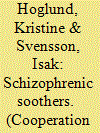

|
|
|
|
|
| Publication |
2011.
|
| Summary/Abstract |
How can the international community influence belligerents in internal armed conflict to move towards peace? Research on influence strategies in international relations commonly stresses the importance of a combined 'carrot-and-sticks' approach, yet little is known about how this mixed strategy is best applied in the context of internal armed conflict. The article addresses this question by developing a theoretical framework exploring the conditions under which the mixed approach is successful in influencing conflict actors and by focusing specifically on non-state actors. It is argued that the effectiveness of the contrast strategy in dealing with non-state actors depends on the balance between the 'good cop' approach and the 'bad cop' approach, the perceptions of the targets and contextual adoption of the sequencing of strategies. We apply this framework to the case of the Liberation Tigers of Tamil Eelam (LTTE) in Sri Lanka between 2002 and 2008, when the international community's initial success later turned into a failed attempt to influence the LTTE in the direction of respect for human rights, in ending the violation of the ceasefire and in preventing a return to the battlefield.
|
|
|
|
|
|
|
|
|
|
|
|
|
|
|
|
| 7 |
ID:
105954
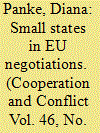

|
|
|
|
|
| Publication |
2011.
|
| Summary/Abstract |
Based on a comprehensive survey conducted in 2009, this article analyses similarities and differences in the policy-shaping activities of all 27 European Union member states in the day-to-day policy-making process of the EU. It shows that some states participate more actively in EU working parties and the COREPER than others. Do bigger states use negotiation strategies more frequently than smaller states? Do the available capacities crucially influence how frequently a delegation employs negotiation strategies in a particular policy field? The article develops a set of willingness- and capacity-related hypotheses and tests them using qualitative and quantitative methods. It shows that small states can surmount size-related difficulties most importantly through the accumulation of expertise. Thus, size is what states make of it. Small states are neither per se political dwarfs nor power-brokers.
|
|
|
|
|
|
|
|
|
|
|
|
|
|
|
|